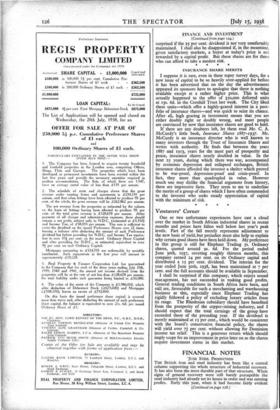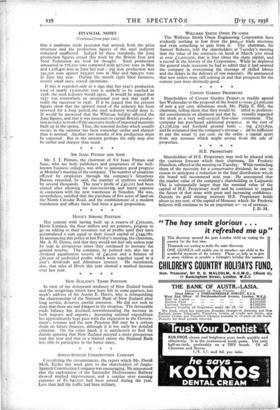FINANCIAL NOTES
*JUNE STEEL PRODUCTION
THE British iron and steel industry has been like a central column supporting the whole structure of industrial recovery. It has also been the most durable part of that structure. When signs of general recovery were still barely perceptible the steel industry had already set its house in order and was earning profits. Early this year, when it had become fairly evident (Continued on page 128.) FINANCIAL NOTES (Continued from page 126.)
that a moderate trade recession had arrived, bath the price structure and the production figures of the steel industry remained unaffected. Judged by these standards, the June production figures issued this week by the British Iron and Steel Federation are food for thought. Steel production amounted to 776,100 tons compared with 957,000 tons in May and i,106,400 tons in June last year : pig iron production was 541,500 tons against 633,900 tons in May and 699,30o tons in June last year. During the month eight blast furnaces, mostly small ones, ceased operations.
If this is regarded only as a sign that last year's production total of nearly 13,000,000 tons is unlikely to be reached in 1938, the steel industry would agree. It would be argued that 1937 was everywhere an exceptional year and that 1938 is really the successor to 1936. If it be argued that the present figures show that the upward trend of the industry has been reversed for a long period, the steel industry would deny it. It would be answered that the Whitsun holiday affected the June figures, and that it was necessary to curtail British produc- tion in order to work off the excessive stocks of imported materials built up in the spring. Thus, the seasonal decline which usually occurs in the summer has been somewhat earlier and sharper than is normal. Another two months of low production must be expected. But in the autumn perhaps the rally may also be earlier and sharper than usual.
* * * *
SIR ISAAC PITMAN AND SONS
Mr. I. J. Pitman, the chairman of Sr Isaac Pitman and Sons, who are both publishers and proprietors of the well- known business colleges, was able to announce good progress at Monday's meeting of the company. The number of situations offered by employers through the company's Situations Bureau exceeded, he said, the number of students available by several thousands. The year's profit of £41,121 had been earned after allowing for non-recurring and heavy expense in connexion with the new warehouse at Neasden. He was, nevertheless, satisfied that the purchase of five acres of land on the North Circular Road, and the establishment of a modern warehouse and offices there had been a good proposition.
* * * *
HOVIS2S STRONG POSITION Not content with having built up a reserve of £5oop0o, Hovis Limited, the flour millers and art printers, propose to go on adding to their resources out of profits until they have accumulated a sum equal to their issued capital of £544,780. In announcing this policy at last Friday's meeting, the chairman, Mr. A. H. Dence, said that they would not feel safe unless year by year in prosperous times they continued to increase the general reserve. T he company, he pointed out, also has a dividend equalisation reserve of £40,000 and a balance of £6o,000 of undivided profits which were together equal to a year's dividends and debenture interest. He mentioned, also, that sales of Hovis this year showed a marked increase over last year.
* * * *
NEW ZEALAND'S TRADE POSITION In view of the downward tendency of New Zealand bonds and the misgivings which have been felt in some quarters, last week's address of Sir Austin E. Harris, who is relinquishing the chairmanship of the National Bank of New Zealand after long service, deserves careful attention. He did not seek to deny that there are real dangers in the situation. The favourable trade balance has declined, notwithstanding the increase in both imports and exports ; increasing national expenditure has approximately kept pace with the expansion in the Govern- ment's revenue and the new Pensions Bill may be a serious drain on future finances, although it is too early for detailed criticism. On the other hand, it is satisfactory to find Sir Austin agreeing that New Zealand enjoyed a more prosperous year last year and that to a limited extent the National Bank was able to participate in the better times.
ANGLO-SPANISH CONSTRUCTION COMPANY
Considering the circumstances, the report which Mr. David McA. Eccles last week gave to the shareholders of Anglo- Spanish Construction Company was encouraging. He announced that the exploitation of the Santander Mediterraneo Railway showed marked improvement, and a surplus overrunnin. g expenses of Ps. 640,000 had been earned during the year. Less than half the traffic had been military. WELLMAN SMITH OWEN PRIORESS The Wellman Smith Owen Engineering Corporation have evidently nothing to fear from the presult trade recession and even something to gain from it. The chairman, Sir Samuel Roberts, told the shareholders at Tuesday's meeting that the value of the contracts on hand at March 31st stood at over Ei,000,000, that is' four times the share capital, and a record in the history of the Corporation. While he deplored the general trade recession he had to admit that it had assisted the company in overcoming the shortage of skilled labour and the delays in the delivery of raw materials. He announced that new orders were still coming in and that prospects for the current year were distinctly good.
* * * *
COVENT GARDEN PROPERTIES
Shareholders of Covent Garden Properties readily agreed last Wednesday to the proposal of the board to issue kr,000,000 of new 4 per cent. debenture stock, Mr. Philip E. Hill, the chairman, telling them that they would be -.titled to preferen- tial consideration on allotment and that he .rsonally regarded the stock as a very well-secured first-class nvestment. The company has purchased additional properut at the cost of £1,236,229 and freehold ground rents L. ing £157,859, and he estimated that the company's revenue -.: aid be sufficient to pay the usual 71 per cent. on the ordina y capital apart from any revenue which might accrue from the sale of properties.
* * * *
H.E. PROPRIETARY Shareholders of H.E. Proprietary may well be pleased with the cautious forecast which their chairman, Sir Frederic Hamilton, offered at.the meeting on Tuesday. While reminding them of the necessity for a conservative dividend, he saw no reason to anticipate a reduction in the final distribution which the board will recommend next year. He announced that the market value of the company's shareholding in Luipaards Vlei is substantially larger than the nominal value of the capital of H.E. Proprietary itself and he continues to regard the future of that mine with great and increasing confidence. Outside its gold mining interests H.E. Proprietary holds about 90 per cent. of the capital of Moussec which Sir Frederic believes will continue to be an important so' -te of revenue.
J. D. M.











































 Previous page
Previous page